Memoirs & Diaries - Defeat at the Marne, July 1918
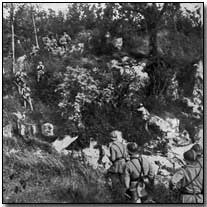
The Marne-Drama of July 15, 1918, seen from the angle of the fighting grenadier regiment No. 5, 36th Infantry Division
"Tomorrow we shall march on Paris!"
Thus we expressed ourselves to the commander of the Third Battalion of the French line Infantry Regiment No. 2, which, driven to the Marne by our briskly attacking grenadiers, was forced to surrender, 800 men strong, on the evening of May 30th.
"Non, Monsieur, a Paris! Jamais! Pensez a 1914! La Marne!" ("Not monsieur, to Paris! Never! Remember 1914! The Marne!")
Seriously and with dignity the French Lieutenant-Colonel thus replied, and we honoured his pride - and grew pensive ourselves for a moment. But then our joy in the glorious success of the day had the upper hand: the Marne was reached, in four days from the Chemin des Dames across the Aisne and Vesle to the mythical stream. Hardly any casualties. The enemy, on the other hand, was most severely damaged. Only - on to Paris!
In the night between the 30th and the 31st of May, however, the 36th Infantry Division received the command: "The position won must be held!"
No advance? Here was disappointment! But one could not see far to the right or the left; and when the water-carriers early in the morning went down to the Marne, they encountered fire aimed at them from the other shore.
We had a new enemy opposite us - one who no longer thought of retreat.
Between this enemy and us was the Marne, a river with a swift current, over 60 metres broad at Chateau-Thierry, very deep and canalized. The valley resembles that of the Weser, except that it is usually somewhat broader.
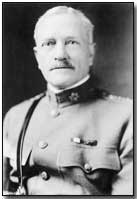 Slopes
to the right and left are luxuriously covered with woods, orchards and
vineyards; there are numerous villages, pastures full of cattle. When
on the morning of May 31st I stood with my commander on the heights to the
east of Chateau-Thierry - truly, a paradise lay before me, the sun smiled
over it, a brisk wind blew across the valley. Here one breathed a
different air; no war - peace.
Slopes
to the right and left are luxuriously covered with woods, orchards and
vineyards; there are numerous villages, pastures full of cattle. When
on the morning of May 31st I stood with my commander on the heights to the
east of Chateau-Thierry - truly, a paradise lay before me, the sun smiled
over it, a brisk wind blew across the valley. Here one breathed a
different air; no war - peace.
Of the enemy nothing could be seen. Scarcely a man was visible in the next five weeks. Only now and then a sharp report when some one carelessly showed himself. We took great pains to point out targets for the artillery, but usually without success.
Men on leave, who came from Charleville in the first days of July, told us, when we had at that time withdrawn quietly to Fere-en-Tardenois, 20 kilometres north of the river: "On July 15th we shall cross the Marne!"
We knew for ourselves that we would attack. As in the days of March, we practiced that kind of attack in which we advanced where the enemy offered the least resistance; we did not storm the strong front, the "forehead," as it were, but attacked it from the flanks and the rear; we followed the firing body and cleared the way, cooperating effectively with the artillery and mine throwers.
But at night we heard first a very muffled shot, then for a while there was calm. Suddenly there rose a rustling and whizzing which grew sharper and sharper, then a blow which started a roaring in one's ears and made the heart of the bravest tremble.
The infantry rushed out of the houses into the fields, for it had no protection against the grenades of the heavy French railway guns, and then returned to its quarters at dusk and quiet descended. The infantrymen were supposed to find recreation, but they could not enjoy life, and many a man had to be buried before command was given for the new attack.
A few days before the assault - on July 12th - we learned details of the operation about to be performed.
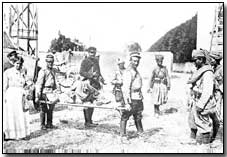 We
were ordered to keep our inquiries within the narrowest limit.
We
were ordered to keep our inquiries within the narrowest limit.
Thus only commanders of regiments and battalions and very few leaders of companies were able to view the first and second places for preparation, the roads for marching, the positions for action, the places for vehicles and all the many points about which one wanted to find out.
My troop, the Grenadier Regiment No. 5, was to cross at the right flank of the 36th Infantry Division near Jaulgonne at two places: to the right, together with the 10th Infantry Division, our proved fighting companion of the 21st and 27th of May, the first days of storm of the offensive of Quentin and of the Chemin des Dames; to the left with the brave Infantry Regiment 175.
Infantry and machine-gun troops were to cross on pontoons, and later on ferries; artillery and vehicles were to be drawn after them over bridges.
At Fismes we practiced in advance with some pontoons on the Ourcq: embarking and disembarking and crossing over. In order to carry out this peace-time manoeuvre, the infantry had to march 18 km twice, in scorching heat and dust which lay piled up high like a wall upon the road that led through the woods from Fere-en-Tardenois.
Tired to death, they returned to their quarters, whence they were driven again in the night by firing. And this a few days before the attack!
The actual command for the operation came very late. I was just sitting and working over it, when a perfectly strange grenadier was announced. With excitement but modestly he asked if it were true that Americans were stationed over there and that our attack was betrayed.
I quieted him, but inquired carefully here and there what the general opinions on the attack might be. There was thorough confidence in the leaders; but there was an indefinite feeling that the affair would not succeed.
"The infantry has the right instinct," veterans of the front used to say.
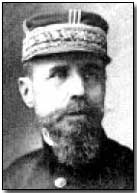 Whoever
saw clearly had to think seriously of failure. The enemy had taken
several prisoners from us, among others an officer of photometry who,
contrary to orders, had carried important maps with him.
Whoever
saw clearly had to think seriously of failure. The enemy had taken
several prisoners from us, among others an officer of photometry who,
contrary to orders, had carried important maps with him.
From here and there we heard of deserters. In defiance of all war experiences little had been done to keep our purpose secret; thus at nine o'clock in the morning, while enemy aviators had been circling above for over four hours, our munition columns still stood crowded together on the streets.
The enemy fire increased each day. When on July 13th we moved to the places of preparation, thick clouds of gas lay on the wood of Jaulgonne.
"It will turn out all right," was the general consolation. The last offensive had given us courage, less to the troops than to the commanders.
Were the men at the front mistaken at the time when they felt that their warning had not been heeded enough? To be sure, it would have made a strange impression if, a few days before the attack, timid voices should have been heard from a division.
And it was quite comprehensibly human that an officer of the general staff, who had exerted his whole strength and intelligence for the hard work of preparing the attack and was looking forward to success, should be shy of saying: "It can't he carried through!"
Two forces were exerting their pressure - the hope roused by ambition: "Perhaps we will succeed after all; the enemy's fighting is so poor"; and then the man at the top who was accustomed to an inconsiderate process of removal whenever he noticed that positions were filled by the wrong men.
The two days which we spent 5 km away from the Marne under cover of the woods passed favourably. We had to suffer little from shooting. The weather was tolerable; it rained somewhat, but the infantry which, to be sure, was quite without cover, had already endured worse things.
"On July 15, 1.10 o'clock in the morning, our own artillery fire is to begin, at 3.40 in the morning the artillery fire will be advanced 300 m. Infantry is to cross over. At 4.50 in the morning the volley is to start and the infantry storm is to begin."
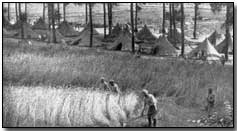 Thank
heaven, now there was clearness! Except for trifles, the entire
apparatus was in good shape; to be sure, some bearers of carrier pigeons
were missing; the wireless station had lost its way. But the main
point was that all posts had their orders in time.
Thank
heaven, now there was clearness! Except for trifles, the entire
apparatus was in good shape; to be sure, some bearers of carrier pigeons
were missing; the wireless station had lost its way. But the main
point was that all posts had their orders in time.
On July 14th in the evening, soon after dark, the infantry troops were led to the front positions. They lay 600-800 m. away from the river on the slopes, in the midst of the forest, which faced the enemy and descended to the Marne. Covers (trenches or shelters) had not been prepared; the only things which marked the positions were tablets which one could not see in the night.
Scarcely ever have I experienced such a dark night as the one from July 14th to 15th. In the woods one could not see one's own hand in front of one's eyes, and ran against trees. The ground was smooth and slippery, the air filled with gas; now and then there was a roaring - for the enemy sent across some heavy grenades.
This lasted hour after hour. The infantry for whose march two hours had been calculated (for a march of 4 km) had not arrived at its positions. The leaders required infinitely much longer time than they had planned, to find the way which they had seen once by daylight.
The hardships for our men were enormous. And when they had arrived at last, the announcements did not sound very edifying: casualties already during the march; great exhaustion of the troops, some ill from marching, some lost. But - they stood where they were supposed to stand.
When is it going to start? We were in a torpor.
At last! A mad artillery fire started. I looked at my watch: 1 o'clock in the morning! Had our artillery made a mistake? It wasn't supposed to begin till 1.10 in the morning!
Out of the holes in which we sat - and back into them fast! Before and behind us the missiles struck. The enemy had begun! Ten minutes later we began, not like one blow, as we had been ordered, but starting out here and there; our fire swelled to a mighty strength for ten minutes, so that we had the hope: now everything will turn out all right!
Then it grew weaker again and weaker. Frequently the enemy fire was much stronger than ours.
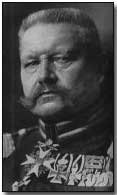 Soon
telephone lines forward and backward were destroyed. If only the
program is carried out right! At 3.50 in the morning no report.
From the rear you are pressed: "Report how things are! Has the infantry
crossed the river?" Answer: "There is no report yet. The enemy
fire is terrible. But we suppose that everything is going on as
planned."
Soon
telephone lines forward and backward were destroyed. If only the
program is carried out right! At 3.50 in the morning no report.
From the rear you are pressed: "Report how things are! Has the infantry
crossed the river?" Answer: "There is no report yet. The enemy
fire is terrible. But we suppose that everything is going on as
planned."
At 4.30 in the morning at last a report from the front: the fusilier battalion, the left front attacking battalion, reports that the prepared positions were subjected to the strongest enemy fire, that two companies were fully broken up and that there were grave doubts about the success of the attack.
This report is immediately passed on verbatim. No word has come as yet, if the crossing has succeeded. The regiment's staff sends out patrols, to make sure of the situation. At last, after hours, a more accurate report arrives.
The first battalion, which was to attack to the right, has been caught terribly in the narrow path that leads down to the river, by enemy fire. Only parts have reached the river. The pioneers have given up. The pontoons have been left 100 metres before the Marne; it is impossible to cross here, as strong enemy infantry is defending the other shore stubbornly with numerous machine guns.
To the left things look a little better. The fusilier battalion has reached the river with two companies and is crossing. Strong parts of the IInd battalion, which were to follow as reserves and which have been led forward very skilfully by Cavalry Captain von Plehwe, the victor of May 3oth, have already arrived at the other shore of the river and are holding the railroad embankment which lies about 600 m to the south of the river.
The casualties of F 5 are very severe, those of II 5 a little lighter. The attack has halted. A strong enemy prevents farther advance.
This is the first picture. The infantry without protection lying in the midst of the great forest of Jaulgonne, which has such dense thickets that it is impossible to pass through, and on the other hand, has scarcely a tree strong enough to serve as cover against an infantry bullet.
Now the massed fire of the enemy artillery bursts into them: not a spot is saved. Here fire from a heavy battery keeps on continually. The striking in the forest is terrible, nerve-racking.
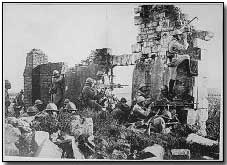 The
clearing over there is caught every five minutes by a light battery and in a
short time is a black crater. And the small path to the right is
spread over with shrapnel, which glow fiery in their courses, like comets.
Our men run aimlessly hither and thither; no cover!
The
clearing over there is caught every five minutes by a light battery and in a
short time is a black crater. And the small path to the right is
spread over with shrapnel, which glow fiery in their courses, like comets.
Our men run aimlessly hither and thither; no cover!
And again roaring, dull reports: gas grenades! Put on the gas masks! One could not see anything before - now still less! Many are seized with a dull despair. They feel helpless: if it would only be day! The wounded scream.
At last a hoarsely gasped command from the leader of the company, even now seriously conscious of his duty: "Begin! Has every man a gun?"
Now forward on the narrow paths which are struck so fiercely, which, nevertheless, are the only ways that lead down to the river. The pioneers stand somewhat lower down. Their leader does not know what to do. He has only a few men. The infantry take hold themselves and carry the pontoons the several hundred metres to the river.
A new situation for the artillery. Everything is out of joint. Several dead and a shattered machine gun stay lying beside the pontoons. Only let us go on, away from here! There are other pontoons below.
The accompanying artillery arrives - for each infantry regiment has one to two batteries, in our case a field-gun battery and a mountain battery. One gun has been ruined by good shots, a second has broken a shaft.
The leaders ask: "Is it wise to advance farther?"
They were commanded to halt and seek a place where they might be stationed if possible outside the firing range. But the mountain battery has already driven into the narrow path through the wood, upon which the 1st battalion marched ahead, and is now caught, for it cannot budge either to the right or the left nor forward.
And one shot after the other hits those fine, proud troops. The horses writhe on the ground, and the munitions explode.
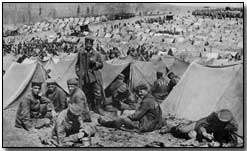 Down
by the river, the pioneers of the fusilier regiment have worked better. Two
pontoons are ready, six should be there. Overladen the first man crosses.
A machine gun shoots from over there, but too high. All duck, throw
themselves down.
Down
by the river, the pioneers of the fusilier regiment have worked better. Two
pontoons are ready, six should be there. Overladen the first man crosses.
A machine gun shoots from over there, but too high. All duck, throw
themselves down.
Has our artillery had no effect? The bank is steep. The first infantrymen pull themselves up by the willows and hang there - a wire obstacle! No one had ever seen that, and no telescope had been able to discover it. Was a trench behind it?
Our men feel their way. It is still quite dark. One of them steps on something soft, which suddenly gives way, and now the hand-to-hand fight has come.
The enemy is entrenched here and has till now taken cover against our artillery fire. One moment - and then we have the upper hand. That is always the way with all "bitter hand-to-hand fights" - that fear of the cold steel seizes the one or the other and he runs away.
The crossing is comparatively quick. We look at the time. "For heaven's sake, the firing body is already marching!" - "Form positions!"
The companies are assigned new aims, as everything has turned out differently than as it was planned.
The railroad tracks are crossed, the railroad station Varennes taken after a short fight, we go on past the road Moulins-Varennes - already 1,000 m south of the Marne! - and up the southern slopes of the valley.
Suddenly from the right there are sounds of sharp firing and screams. In the morning mist, in the high grain field, one can see storm columns advance, dressed in brown - Americans!
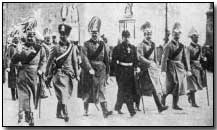 Now
and then they stand still and shoot. Our men come running back.
The situation is extremely critical. Where are our neighbours, the 6th
grenadiers? The attack must have been given up.
Now
and then they stand still and shoot. Our men come running back.
The situation is extremely critical. Where are our neighbours, the 6th
grenadiers? The attack must have been given up.
The grenadiers are blindly shooting their volleys "according to program." This is to last until 11 o'clock in the morning, then they will be free for other tasks. But these they could hardly have carried out anyway, for observation of the battle is very hard; low mists veil the landscape, the grain is high, and movements are covered by the many little woods and orchards.
The commanders of the IInd battalion of the fusiliers, Cavalry Captain von Plehwe and Captain Eben who are far at the front of their companies, realize that there is extreme danger in delay. All able to shoot, aim against the enemy on the right flank.
One must admit he is courageous unto death. Not till the machine-gun fire and the desperate shooting of our infantry had reaped a bloody harvest in his lines, did he halt and run back. But we take breaths of relief. Yet it is clear to each one of us: our own attack has failed! We must see to it that we can hold the position we have won with our weak forces, numerically much smaller than the enemy's.
The railroad line seems adequate for the defence. It is situated somewhat high and offers protection against fire, although on the other hand it is naturally a good target for the enemy artillery.
Methodically the parts which are farther front are drawn back to this point. The right endangered flank is strongly reinforced. Toward 11 o'clock in the morning there is communication with our neighbour to the left. He has fared a little better, but is now fighting hard too.
The Grenadier Regiment No. 6 at first came across with strong forces, but encountered a superior foe and was annihilated. One of our companies which strangely broke through the enemy line - the 6th, under Lieutenant Oberg believes that there are German troops ahead and advances 4 km deep, along the eastern slope of the Surmelin valley, right into the enemy.
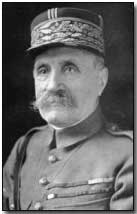 Below
to the right, American infantry columns are marching; above, to the left,
the enemy batteries are firing continually, till at last the little band is
discovered. Now it is in a difficult position, but holds its own
bravely till evening.
Below
to the right, American infantry columns are marching; above, to the left,
the enemy batteries are firing continually, till at last the little band is
discovered. Now it is in a difficult position, but holds its own
bravely till evening.
Its death-defying leader and a few men make their way through the enemy lines backwards to another part of the German troops, and rejoin us. This was a ray of light, but it was the only one in this operation, and therefore I mention it.
On the afternoon of July 15th it was possible to improve the line somewhat, as the enemy on the Marne, probably from fear of a double flanking movement, drew back its position somewhat; but this did not change anything in the final result of the day. It was the severest defeat of the war!
One only had to descend the northern slopes of the Marne: never have I seen so many dead, nor such frightful sights in battle. The Americans on the other shore had completely shot to pieces in a close combat two of our companies.
They had lain in the grain, in semicircular formation, had let us approach, and then from 30 to 50 feet had shot almost all of us down. This foe had nerves, one must allow him this boast; but he also showed a bestial brutality.
"The Americans kill everything!" That was the cry of horror of July 15th, which long took hold of our men. At home meanwhile they were sarcastic about the imperfect training of this enemy, about the American "bluff" and the like. The fact that on July 15th more than 60 per cent of our troops led to battle were left dead or wounded upon the battlefield may substantially be charged to his credit.
Our hopes that perhaps on the rest of the attacking front we might achieve better results unfortunately proved vain. To be sure, the usual reports arose: "Rheims has fallen!" "To our left the Bavarian division has advanced 15 km!" But there was unhappily no truth in them, as happened so often.
Everywhere the same sight: courageous, death-defying attack, the severest casualties and no success in any way worth mentioning.
t the Marne front a long, narrow bridgehead had been made. It was naturally expected that the strongest attacks would be aimed against this in a short while. We prepared for this situation, but had small hope of being able to keep our position: 1 to 2 km behind us was the river - this did not help our prospects.
On July 17th the first attacks were started. They were repulsed. On the, 18th the enemy went at it with more energy and brought armoured tanks into the fight. But without success.
Like salvation we welcomed the command: "Front to be withdrawn behind the Marne!"
In the night between the 18th and 19th of July we withdrew. The Marne bridges were afire. One bridge was already destroyed. Yet we crossed in tolerable condition. The enemy, at any rate, noticed nothing, so that our patrols left behind on the southern shore could remain over there several hours and could return unmolested.
We hoped for rest. A day like the 15th of July affects body and nerves for weeks. Our lines were thinned. Low spirits took hold of most of the men. So infinitely many dear comrades we had left over there. Many of them we had not been able to lay in the earth.
It had all been like a warning: your turn too is coming! Thus thought the man at the front.
Then the report reached us: trouble to the right. The enemy, enormously strong, has attacked from the woods of Villers-Cotterets, has advanced 15 km on the first day.
"We must go back." We gnashed our teeth, but believed it, even before we received details officially. And these troops, which had just endured such hardships, had the task of giving their last, of hurling themselves as an obstacle against the overwhelming storm wave.
They did this calmly and patiently, sacrificed the remainder of the veterans of 1914, and did not lose their honour.
Source: Source Records of the Great War, Vol. VI, ed. Charles F. Horne, National Alumni 1923
Photographs courtesy of Photos of the Great War website.
The first zeppelin raid on London was on 31 May 1915. Earlier raids in January 1915 had avoided London. The London raid resulted in 28 deaths and 60 injuries.
- Did you know?
